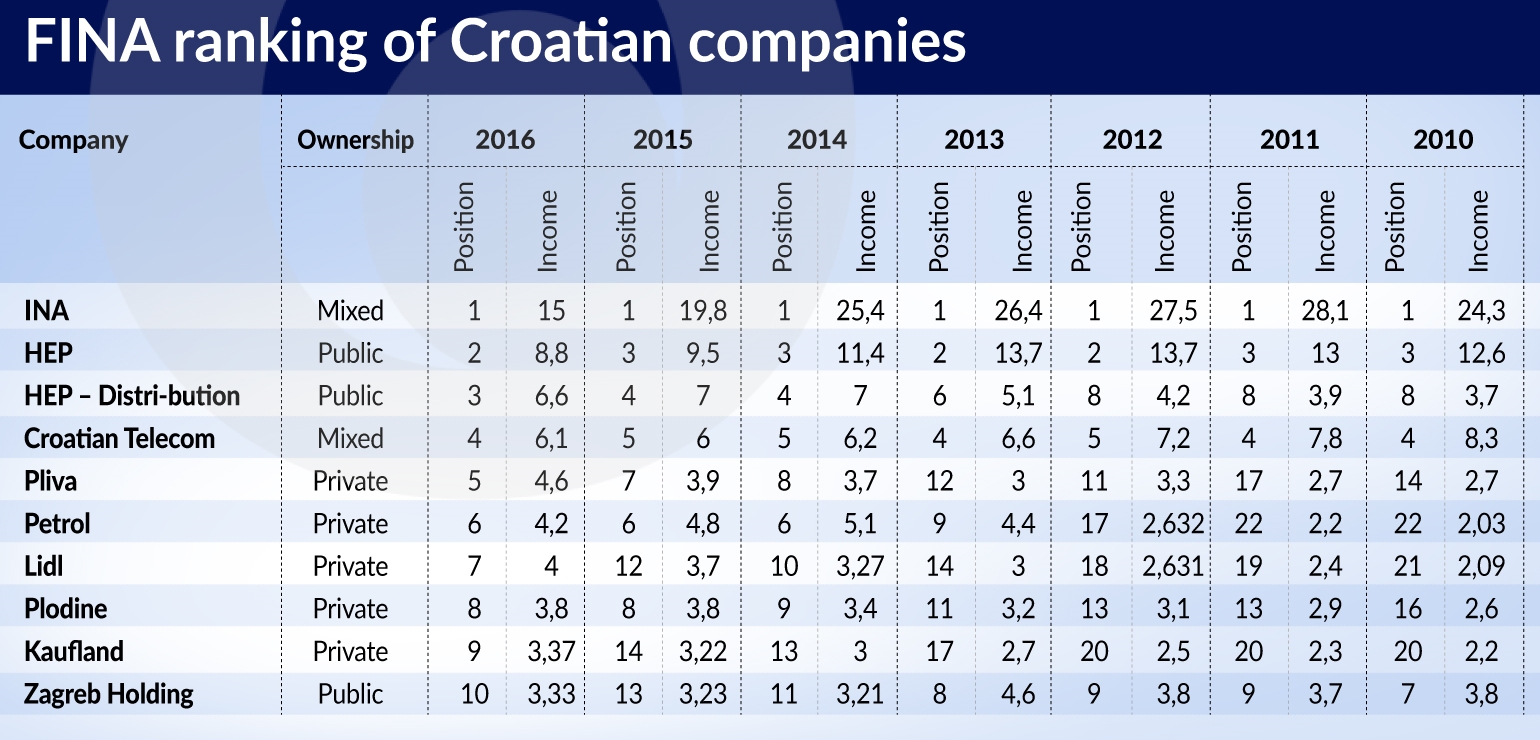The research of over 10 years, showed that it was a group of 20 companies, of which three were noted at all the rankings throughout the period. This was Oil Industry – INA, Croatian Electricity Production HEP, and Croatian Telecom – HT. One of subsidiary companies of HEP – HEP Distribution System Operator was noted nine out of ten times on the list (in 2007 it was on the 11th position).
INA-Oil Industry has been reorganized through all 10 years as a company which earned the most revenues each year. From the presented data, it is apparent that the company has reduced income from HRK24bn in 2007 to HRK15.1bn in 2016 (down 37.1 per cent). In the observed period, INA-Oil Industry noted highest income in 2011, amounting to HRK28.1bn, which was over twice more than the income of the next company Konzum (not classified in the table for 2016), with HRK13.3bn
Today INA’s shareholders are: the Croatian State Treasury (44.83 per cent) and the Hungarian MOL company (47.15 percent of shares). For several years the government in Zagreb has pushed its Hungarian partner to renounce its shares. MOL however does not want to agree on the proposed conditions, which do not reflect the market value of the company. Despite the financial difficulties and decrease in income INA still is the most profitable of all Croatian companies.
A state-owned HEP was the second or the third ranked company during the observed period, interchangeably with the privately held company Konzum, which is not on the list for 2016 because it did not submit an annual financial report. Today, Konzum undergoes process of deep restructuring, if not insolvency due to bold policy of his creator and owner – Ivica Todorić.
Croatian Telecom, another company with mixed, public and private ownership, has been ranked over the observed period as the fourth or the fifth. Deutsche Telekom AG owns 51 per cent of HT’s shares, with the War Veterans’ Fund and the Pensioners’ Fund holding 7 and 3.5 per cent respectively. The remaining 38.5 per cent remains in the hands of private and institutional investors. Telekom is the largest of the three mobile operators on Croatian market and the main operator of the landlines.
Zagreb Holding was ranked among the top 10 companies with the highest income from 2007 to 2016 with the exception of 2014 (11th place) and 2015 (13th place). For this state-owned company, it is worth pointing out that part of the revenue comes from grants, state aids and subsidies, whose share in total revenues changed from year to year, and ranged from 15.5 per cent to 21.4 per cent. Income from different subsidies, including the state ones, was also realized by the HEP-Distribution from 2007 to 2013, but with a smaller share of total income(from 4.2 per cent to 5.4 per cent).
Pliva, along with INA-Oil is one of the companies in the manufacturing industry, ranked among top 10 companies in 2016 and 2015. Pliva is a part of Israeli – Teva Group and as such is the largest pharmaceutical producer in Croatia. 80 per cent of the production is exported, mainly to USA and Russia. Pliva operates also on other post-Yugoslav markets – Bosnia and Herzegovina, Slovenia, Serbia, Montenegro and Macedonia.
New to the rankings are Lidl and Kaufland. In the period under review, the biggest increase in total income among the 10 mentioned companies, was noted by Lidl, which in 2007 was ranked at the 107th place and in 2016 at the 7th place.
Jan Muś is a lecturer at the Vistula University.


